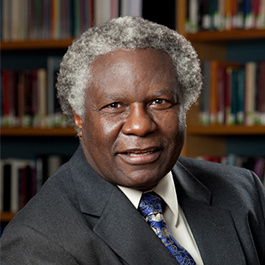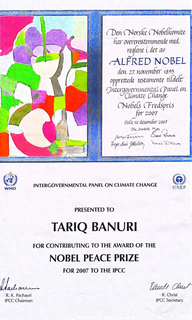
Urban agriculture,urban farming, or urban gardening is the practice of cultivating, processing, and distributing food in or around urban areas. It encompasses a complex and diverse mix of food production activities, including fisheries and forestry, in many cities in both developed and developing countries. Urban agriculture is also the term used for animal husbandry, aquaculture, urban beekeeping, and horticulture. These activities occur in peri-urban areas as well. Peri-urban agriculture may have different characteristics.

The School of International Service (SIS) is American University's school of advanced international study, covering areas such as international politics, international communication, international development, international economics, peace and conflict resolution, international law and human rights, global environmental politics, and U.S. foreign policy.

Calestous Juma was a Kenyan scientist and academia, specializing in sustainable development. He was named one of the most influential 100 Africans in 2012, 2013 and 2014 by the New African magazine. He was Professor of the Practice of International Development and Faculty Chair of the Innovation for Economic Development Executive Program at Harvard Kennedy School. Juma was Director of the School's Science, Technology and Globalization Project at Harvard Kennedy School as well as the Agricultural Innovation in Africa Project funded by the Bill and Melinda Gates Foundation. His last book, Innovation and Its Enemies: Why People Resist New Technologies, was published by Oxford University Press in 2016.

Environmental planning is the process of facilitating decision making to carry out land development with the consideration given to the natural environment, social, political, economic and governance factors and provides a holistic framework to achieve sustainable outcomes. A major goal of environmental planning is to create sustainable communities, which aim to conserve and protect undeveloped land.

The University of Michigan School for Environment and Sustainability (SEAS) is an interdisciplinary professional school focused on the environmental natural and social sciences, environmental justice, and sustainable landscape architecture. SEAS provides graduate-level degrees at the master’s and doctorate levels, along with undergraduate degrees through the Program in the Environment (PitE), a university-wide collaboration.
Sustainability science first emerged in the 1980s and has become a new academic discipline Similar to agricultural science or health science, it is an applied science defined by the practical problems it addresses. Sustainability science focuses on issues relating to sustainability and sustainable development as core parts of its subject matter. It is "defined by the problems it addresses rather than by the disciplines it employs" and "serves the need for advancing both knowledge and action by creating a dynamic bridge between the two".
Yehua Dennis Wei is a Chinese-American geographer. He is a professor in the Department of Geography and a senior scholar in the Institute of Public and International Affairs at the University of Utah. His research has been funded by the NSF, Lincoln Institute of Land Policy, National Geographic Society, Ford Foundation and Natural Science Foundation of China (NSFC). He has received awards for research excellence from the NSFC, Association of American Geographers’ (AAG) China, Asian and Regional Development and Planning Specialty Groups, and University of Wisconsin-Milwaukee.RESEARCH INTERESTS: Economic/Urban Geography, Urban and Regional Development, Spatial Inequality, Sustainable Cities, GIS Spatial Analysis, China, and the United States.
Randall Crane Ph.D. is professor emeritus of the UCLA Luskin School of Public Affairs, where he taught since 1999. He was associate then editor-in-chief of the Journal of the American Planning Association, chair of the executive committee and director of Undergraduate Studies of the Luskin School, associate and acting director of the UCLA Institute of Transportation Studies, and department vice chair and director of PhD studies of the urban planning department, among other cross-campus administrative appointments.

Benjamin K. Sovacool is an American academic who is director of the Institute for Global Sustainability at Boston University as well as Professor of Earth and Environment at Boston University. He was formerly Director of the Danish Center for Energy Technology at the Department of Business Development and Technology and a professor of social sciences at Aarhus University. He is also professor of energy policy at the University of Sussex, where he formerly directed the Center on Innovation and Energy Demand and the Sussex Energy Group. He has written on energy policy, environmental issues, and science and technology policy. Sovacool is also the editor-in-chief of Energy Research & Social Science.

Dorceta E. Taylor is an environmental sociologist known for her work on both environmental justice and racism in the environmental movement. She is the Senior Associate Dean of Diversity, Equity, and Inclusion at Yale School of the Environment, as well as a Professor of Environmental Justice. Prior to this, she was the Director of Diversity, Equity, and Inclusion at the University of Michigan's School of Environment and Sustainability (SEAS), where she also served as the James E. Crowfoot Collegiate Professor of Environmental Justice. Taylor's research has ranged over environmental history, environmental justice, environmental policy, leisure and recreation, gender and development, urban affairs, race relations, collective action and social movements, green jobs, diversity in the environmental field, food insecurity, and urban agriculture.

The contributions of women in climate change have received increasing attention in the early 21st century. Feedback from women and the issues faced by women have been described as "imperative" by the United Nations and "critical" by the Population Reference Bureau. A report by the World Health Organization concluded that incorporating gender-based analysis would "provide more effective climate change mitigation and adaptation."
Shobhakar Dhakal is the Vice President for Academic Affairs at the Asian Institute of Technology, Thailand since April 2021. In the past he was Dean of School of Environment, Resources and Development, and Head of Department of Energy Environment and Climate Change of Asian Institute of Technology. His main areas of expertise are in energy policy, climate change mitigation and policies, policy modelling and analysis, and cities and climate change. Dhakal actively contributes to international and scientific arena.

Robert Cervero is an author, consultant, and educator in sustainable transportation policy and planning. During his years as a faculty member in city and regional planning at the University of California, Berkeley, he gained recognition for his work in the sphere of urban transportation and land-use planning. His research has spanned the topics of induced demand, transit-oriented development (TOD), transit villages, paratransit, car sharing, and suburban growth.
Julian Agyeman is a Professor of Urban and Environmental Policy and Planning, and Fletcher Professor of Rhetoric and Debate, at Tufts University,. He is co-founder and editor-in-chief of Local Environment: The International Journal of Justice and Sustainability. He is a Fellow of the Royal Society of the Arts and the Royal Geographical Society.

Tariq Javed Banuri is a Pakistani academic, development economist, environmentalist, climate scientist, educationalist, human rights advocate, and author who holds a PhD in economics from Harvard University and who is the fourth and current Chairperson of the Higher Education Commission (HEC), a statutorily established regulatory agency whose mandate is to improve and promote higher education and research & development (R&D) within Pakistan. Tariq Banuri has broad experience on the interface between policy, research, and practical actions on the realization of the goal of sustainable development. He has worked in government, academia, civil society, and the international system, specializing in economic development.
Andrew Atherton is Global Director Transnational Education for Navitas Limited, a leading global education provider.

Sarah Bekessy is an Australian interdisciplinary conservation scientist with a background in conservation biology and experience in social sciences, planning, and design. Her research interests focus on the intersection between science, policy, and the design of environmental management. She is currently a professor and ARC Future Fellow at RMIT University in the School of Global, Urban and Social Studies. She leads the Interdisciplinary Conservation Science Research Group.

John Rennie Short is a professor of geography and public policy in the School of Public Policy at University of Maryland, Baltimore County.
Xuemei Bai (白雪梅) is a professor for Urban Environment and Human Ecology at the Australian National University. She was the winner of the 2018 Volvo Environmental Prize, and is an elected fellow of the Academy of the Social Sciences in Australia.
Taibat Olaitan Lawanson is a professor of urban management and governance at the University of Lagos, Nigeria, where she leads the Pro-Poor Development Research Cluster. She is also co-director at the University of Lagos Centre for Housing and Sustainable Development. Her research focuses on the interface of social complexities, urban poverty and the quest for spatial justice in urban planning in Africa.











